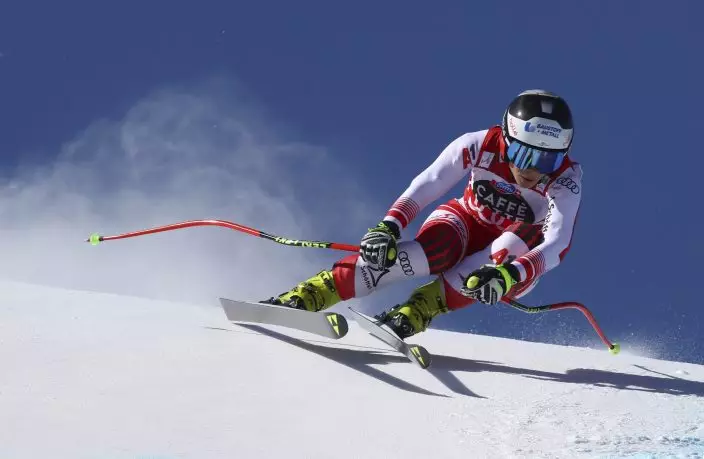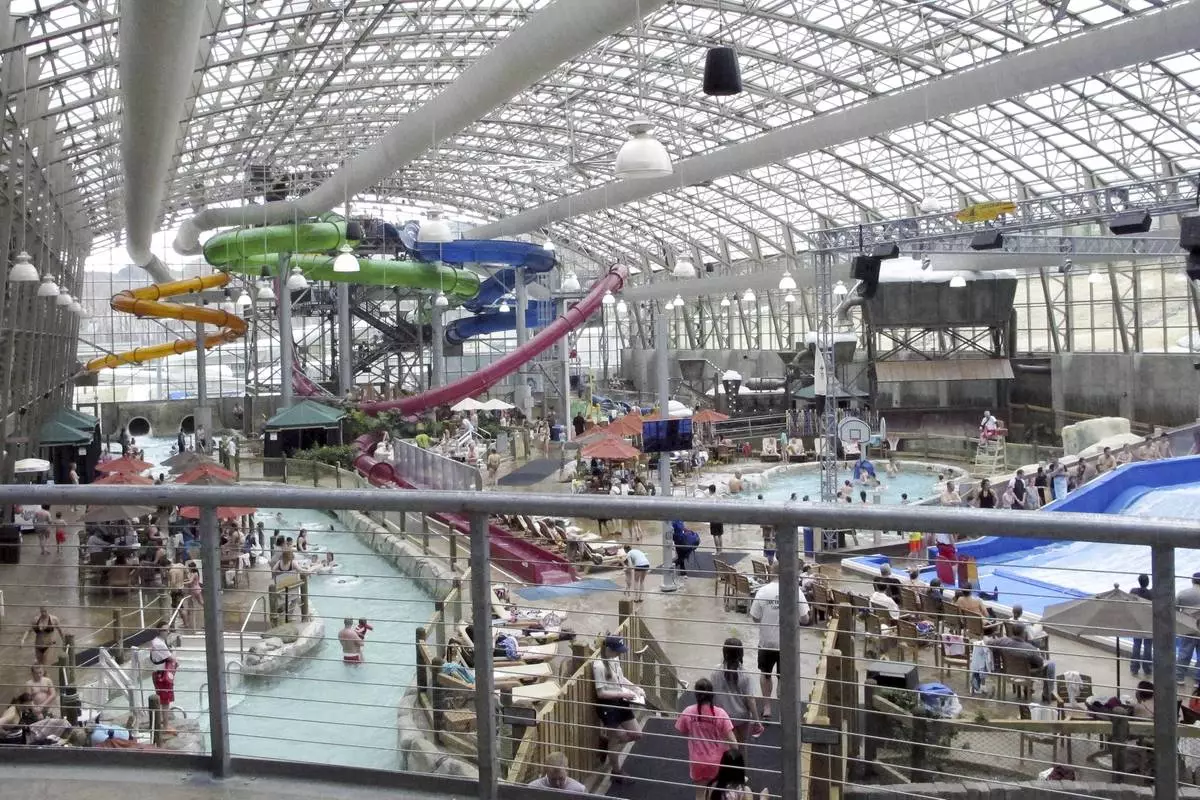Dominik Paris of Italy led the final training run for the men's downhill at the World Cup Finals on Tuesday, and Stephanie Venier of Austria was fastest in the women's session.
Paris finished 0.48 seconds ahead of Mauro Caviezel of Switzerland, and 0.55 ahead Adrian Smiseth Sejersted of Norway.
Beat Feuz, who leads the discipline standings, posted the seventh-fastest time, 1.20 off the lead.

Austria's Nicole Schmidhofer competes in an alpine ski, women's World Cup downhill training, in Soldeu, Andorra, Tuesday, March. 12, 2019. (AP PhotoAlessandro Trovati)
Paris is the only racer who can prevent Feuz from winning the downhill title for a second straight season. Trailing by 80 points, Paris could only close the gap if Feuz finishes outside the top 12 in Wednesday's race.
Venier led Italian teammates Nadia Fanchini and Sofia Goggia by 0.25 and 0.77 seconds, respectively.
Nicole Schmidhofer, who leads Austrian teammate Ramona Siebenhofer by 90 points in the season standings, finished more than two seconds off the lead.
Siebenhofer did not complete her run after an apparent issue with one of her ski boots.
The training was interrupted following a crash by Ragnhild Mowinckel of Norway, who fell after landing a jump and slid into the safety netting. Mowinckel was transported off the hill on a sled with unknown injuries.
In Monday's first training, Lara Gut-Behrami injured her back and right foot and in a crash, ruling the former overall champion out of the rest of this week's action.
More AP sports: https://apnews.com/apf-sports and https://twitter.com/AP_Sports
The state of Vermont did not provide adequate oversight to prevent the massive fraud that occurred in ski area and other development projects funded by foreign investors' money through a special visa program, a state audit has found.
The financial scandal first revealed in 2016, which became the state's largest fraud case, shook Vermont and the economically depressed region called the Northeast Kingdom.
In 2018, Vermont's former attorney general asked for an audit of the state's involvement in the projects at Jay Peak and Burke resorts to address the loss of trust in state government from the fraud, State Auditor Doug Hoffer wrote in the report released on Thursday. The audit was completed after the legal proceedings concluded, he wrote.
The findings should not be entirely surprising, Hoffer wrote.
“In short, we found a pattern of misplaced trust, unfortunate decision-making, lengthy delays, and missed opportunities to prevent or minimize fraud,” Hoffer wrote.
Ariel Quiros, a Miami businessman and former owner of two Vermont ski resorts, was sentenced in 2022 to five years in prison for his role in a failed plan to build a biotechnology plant in Newport using tens of millions of dollars raised through the EB-5 visa program. Under the program, foreigners invest $500,000 in U.S. a project that creates at least 10 jobs in exchange for a chance to earn permanent U.S. residency. William Stenger, the former president of Jay Peak, and William Kelly, an advisor to Quiros, each got sentences of 18 months.
But the fraud encompassed seven other projects at Jay Peak and Burke resorts.
In 2016, the federal Securities and Exchange Commission and the state of Vermont alleged that Quiros and Stenger took part in a “massive eight-year fraudulent scheme.” The civil allegations involved misusing more than $200 million of about $400 million raised from foreign investors for various ski area developments through the EB-5 visa program “in Ponzi-like fashion.”
In a Ponzi scheme, money provided by new investors is used to pay high returns to early-stage investors to suggest the enterprise is prosperous. The scheme collapses when required redemptions exceed new investments.
Quiros and Stenger settled civil charges with the SEC, with Quiros surrendering more than $80 million in assets, including the two resorts. In the seven projects at Jay Peak and Burke, “construction was done but not always to the specifications or at the costs told to the investors. Significant funds were simply misused,” the report said.
Under the EB-5 program, the federal government designates regional centers to promote economic growth and oversee and monitor sponsored projects, the report states. Most regional centers are privately owned but the Vermont Regional Center was state government-run.
The center, which was the EB-5 office within the Agency of Commerce and Community Development, had competing duties: to market and promote EB-5 projects and to regulate them, the auditor's report states.
"Experts and policymakers have long warned against such arrangements for fear that an agency relied upon to help a project succeed may be reluctant to exercise its regulatory powers. In addition, a marketing office may not have the skill sets needed to properly regulate complex financial arrangements such as EB-5. Unfortunately, this proved all too true at ACCD,” the report states.
Last July, the state of Vermont agreed to pay $16.5 million to settle all pending and potential lawsuits from foreign investors in the development projects.
The United States Citizenship and Immigration Services is still determining the immigration status of the Jay Peak and Burke investors, Goldstein wrote. At least 424 of 564 Jay Peak investors have already received green cards and the state is working to increase the chances that many more do, she wrote.

FILE - The water park at Jay Peak resort in Jay, Vt., April 18, 2016. A state audit has concluded Thursday, March 28, 2024, that Vermont did not provide adequate oversight to prevent the massive fraud that occurred in ski area and other development projects funded by foreign investors' money through a special visa program. (AP Photo/Lisa Rathke, File)




